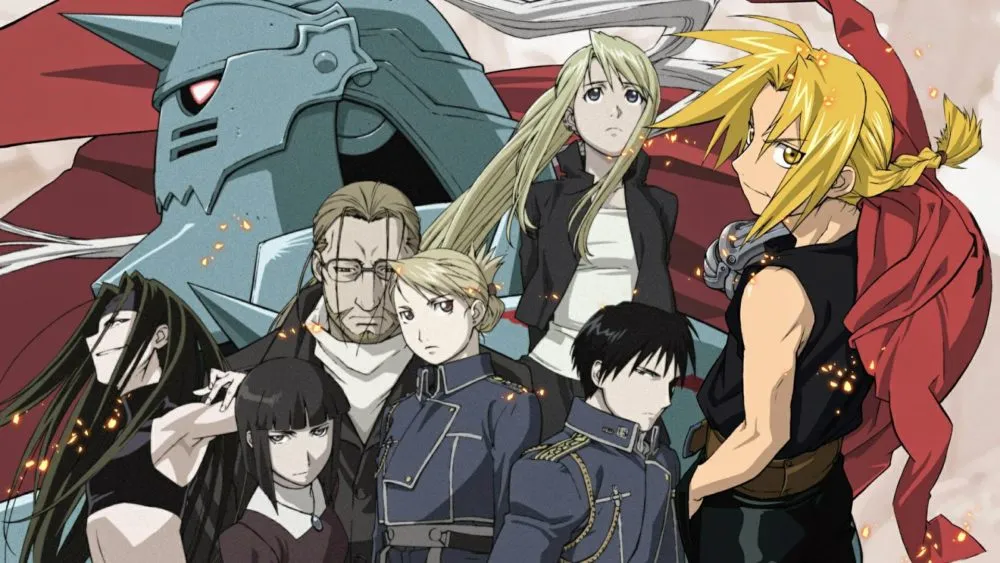Cowboy Bebop, Neon Genesis Evangelion, Gundam Wing, Dragon Ball Z; these are all anime that have had a profound impact on the medium, and ones that still get talked about to this very day. Among these kingpins of the genre is an anime celebrating its 10th anniversary, Fullmetal Alchemist: Brotherhood, and looking back now it’s clear that Brotherhood deserves a spot among the greats.
It’d be fair to say that Fullmetal Alchemist has had just as profound an impact on anime as something like Dragon Ball Z, and even though it was incredibly popular at its release, Brotherhood has only become more beloved by fans and newcomers over the years, and for good reason.
Fullmetal Alchemist: Brotherhood does so much right that it’s almost hard to know where to start, but lets first say it can serve as a fantastic introductory anime for those uninitiated. Although the series is over 50 episodes long, it has brisk pacing that keeps the action moving, while constantly advancing multiple different plotlines.
The action is fantastically animated and super easy to follow, something that the studio, Bones, would definitely become known for and do time and again in later anime series, like Mob Psycho 100 and My Hero Academia.
Brotherhood tells the story of Edward and Alphonse Elric, two brothers who tried to use alchemy to bring back their dead mother, and paid the ultimate price, with Ed losing one of his arms and Al losing his entire body.
With this initial setup, Fullmetal Alchemist sets up loss to be a major theme, and that’s something that runs throughout the entire series and ties into many of its characters. Whether it’s the humanity that Scar lost, or the child that Izumi Curtis lost; so many characters and plotlines of Brotherhood involve the idea of loss and how characters cope with that.
It’s just one thing that makes the series so relatable, as these are genuine characters with human emotions, who do their best to cope with horrible situations.

Fullmetal Alchemist also plays around with the idea of Nihilism (the belief that life is meaningless), Epistemology (the study of knowledge), and plenty of other weighty philosophical themes. The series ties all of its themes together to make a broader statement on life itself and how we, as humans, choose to live it.
All of this sounds pretty terrible, sure, and Fullmetal Alchemist is heavy on sadness and emotion, but it’s also interspersed with moments of happiness and joy. It’s a surprisingly funny series, but the important thing is that the anime knows when to play things straight and when to have a bit of comedic fun.
Brotherhood is a masterful series at changing tone, and the split between lightheartedness and melancholy feels seamless. Again, this is a talent that Studio Bones has, as its latest and greatest adaption, My Hero Academia, is known for doing the exact same thing.
There are countless other reasons to list off as what makes Brotherhood so good; whether it’s the imaginative way it uses Alchemy in battles, or the terrible emotional gut punches it delivers. However, let’s move on and talk about the impact the series has had.
Brotherhood, and Fullmetal Alchemist in general, would go on to inspire a ton of different tropes and ideas in anime.
It’s the quintessential shonen anime, filled with everything that makes the genre what it is; battles with flashy powers, a young headstrong protagonist, shadowy villain organizations, a colorful cast of supporting characters, science fiction, and fantasy themes, and the idea of honor and sacrifice.
Fullmetal Alchemist takes all of the shonen ideas and helps elevate them, partially through genuine characters that you care about. Brotherhood makes this even better by providing stellar animation, voice acting, and condensing the original manga in smart ways while still hitting all of the major beats and story events.
There are obvious comparisons that can be drawn between Brotherhood and later anime series like Fairy Tail, The Seven Deadly Sins, and even Attack on Titan. In Fairy Tail magic forms the basis of the world much like Alchemy does, and many of the characters have tragic backstories that help tie into the main plot.

The Seven Deadly Sins features a protagonist who’s always underestimated because of how short he is, effectively uses both comedy and drama together, and plays with the idea of the seven sins as physical characters, although The Seven Deadly Sins has them as the protagonists while in Brotherhood they’re the antagonists.
Meanwhile Attack on Titan, just like Brotherhood, features a protagonist who loses their mother at a young age and then becomes completely hellbent on getting revenge. Both series are heavy on philosophical themes, and the idea of how Titans functions is a bit similar to alchemy.
Again, you can even see similarities in the way Studio Bones adapts My Hero Academia, to how they adapted Fullmetal Alchemist with Brotherhood. Both series cut out parts that aren’t needed, but take time to develop their side characters in interesting ways, and each series has a great way of animating each character differently in battle to show the differences in their combat abilities.
Of course, you can’t talk about Fullmetal Alchemist without mentioning its creator Hiromu Arakawa, and all of the series’ greater themes and story come from her. Arakawa should absolutely be commended on creating one of the most fascinating manga of all time, and Fullmetal Alchemist Brotherhood simply made the series even better with one of the best anime adaptions of all time.
Looking back now, 10 years later, Fullmetal Alchemist Brotherhood seems better than ever, like a true classic that easily sits right next to the likes of Cowboy Bebop. It’s one of the defining shonen anime, and if you count yourself as an anime fan, in any way, this is one of the series that you absolutely have to watch.
